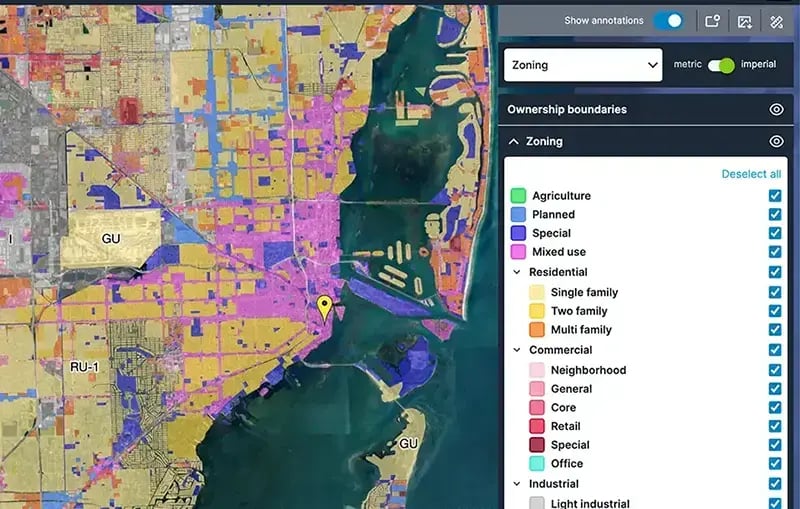Being a property developer can be a challenging job, particularly in today’s tricky economic climate.
One of the most difficult parts of the development process is being able to acquire the data you need to do your job effectively.
Below, we take a look at some of the top data-sourcing challenges facing developers and builders today. And more importantly, we share how you can overcome these issues.
Five data challenges facing developers
1. Disparate data sources
Gathering all the data you need to make a complete assessment of your site can sometimes feel like a treasure hunt. But slightly less fun and with a lot more risk.
No centralized source of key land and property information means that you typically have to jump between a whole range of systems. Or you may even have to dig up records at the City Planning Office.
All this is taking up time you can’t really spare.
So, we built a platform that has all the most important data in one place – LandTech.

2. Unstandardized formatting of data
Another pressing issue when you’re collecting data is the lack of standardization across different data sources.
Even once you’ve gathered everything you need, you may end up with a range of different formats or zoning codes, or a mix of paper and electronic files.
All this makes it hard to compare sites like for like. For example, you may be looking at two plots of land, but the way that zones are visualized and classified might not directly align – making it more difficult to make a judgment call quickly.
At LandTech, we gather all this data, standardize it and present it in an easy-to-digest format so you can get the instant overview you need.
3. Questionable quality
The next hurdle that you have to overcome is data quality. Is the source reliable and something that you’re willing to base your potentially million dollars worth of investment on?
We know how much is at stake for our customers, so we pride ourselves on having the best quality data in LandTech.
We make sure our data is the most up-to-date, accurate and from a source that you can trust.
4. Aligning with industry trends
Having the right data that speaks to, or helps you interpret, industry trends is also a challenge.
With uncertainty in the market, there’s a lot to keep on top of – such as fluctuating interest rates and house prices. Data that reflects these changes in real-time helps you to move quickly and make sure you’re aligned with industry averages.
Our comparables data helps you to benchmark your build against other projects in the surrounding area.
We’re also steadily expanding our coverage on FLU and permit data so you’ll be able to paint a picture of the past, present, and future trends for a parcel of land.

5. Time-consuming and inefficient
The bottom line is that all of these traditional ways of working are slowing you down. And in an industry where time equals money, the longer you’re spending on sourcing and analyzing data, the less time you’re spending on getting your development built and maximizing ROI.
At LandTech, all of our tools are designed to save you time (and, as a result, money).
And with current market conditions, it’s more important than ever to have quality efficient tools at your disposal to help you get through these uncertain times. You need something quick, efficient, and easy to use – providing you with all the information you need to find and assess sites at your fingertips.
In other words, you need LandTech.
How can LandTech help
LandTech is a powerful tool for sourcing and assessing opportunities. From zoning to hazards and demographics, we have all the data you need in one place to empower you to do your job faster – and save money.
Want to find out more?
Download our Buyer’s Guide today and learn more about how LandTech can help bring your data together.
Learn more